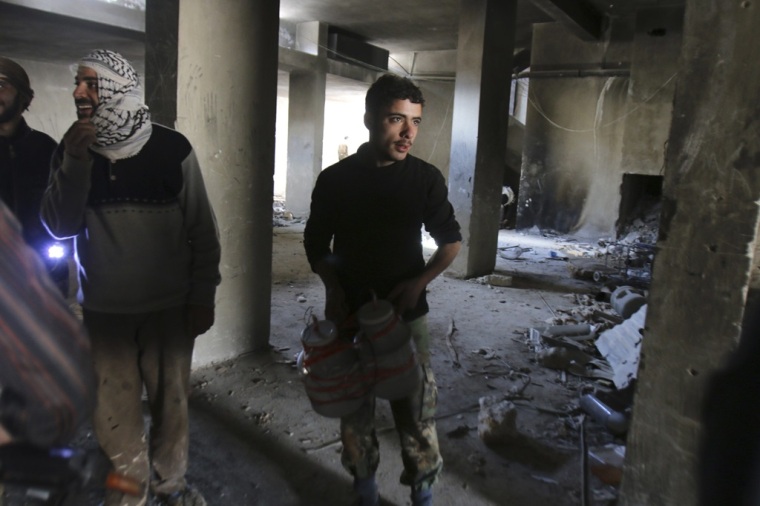U.S. To Send 1,000 Troops To Help Train Syrian Rebels Against ISIS

The Pentagon is ready to send up to 1,000 soldiers and personnel to train Syrian rebels against the Islamic State (ISIS), spokesman Navy Rear Adm. John Kirby said in a press briefing on Friday.
Troops who will be deployed include not only trainers but support personnel as well, Kirby said, adding that forces will range from special operations to conventional.
"I think several hundred trainers. I think you will also look at -- it could be about a like number of enablers and support personnel. So all told, the number total for this mission could approach 1,000. It might even exceed that. I would -- I can't rule that out," said Kirby.
The spokesman said training opposition forces has three main objectives. "One, to get them [Syrian rebels] prepared and able to defend their own communities and their own citizens and go back to their own towns and cities and help defend their neighbors," Kirby said.
"Two, to eventually go on the offensive against ISIS inside Syria. And three, to help work with political opposition leaders towards a political solution in Syria. That's -- that's what we're getting them ready to do," Kirby said.
Troops will be given orders as soon as "within the next week or so," he said, adding that the soldiers will "flow in" over the next four to six weeks.
Training is expected to take several months, but Syrian forces could be ready to enter the fight in Syria against the ISIS by the end of this year.
Training will be held in various sites in the region with "significant contributions," according to the U.S. Department of Defense. A report by RT named three different training sites: Saudi Arabia, Qatar, and Turkey.
Syrian opposition forces will be carefully selected, Kirby said. "There will be a significant vetting program in place, multi-layered, and one that is implemented over the course of the training to make sure we're dealing with individuals and units that are trustworthy."
The spokesman said information and intelligence from the area and from partner nations in the region will be included in the vetting process.
 Christians don't have to affirm transgenderism, but they can’t express that view at work: tribunal
Christians don't have to affirm transgenderism, but they can’t express that view at work: tribunal Archaeology discovery: Medieval Christian prayer beads found on Holy Island
Archaeology discovery: Medieval Christian prayer beads found on Holy Island Presbyterian Church in America votes to leave National Association of Evangelicals
Presbyterian Church in America votes to leave National Association of Evangelicals Over 50 killed in 'vile and satanic' attack at Nigerian church on Pentecost Sunday
Over 50 killed in 'vile and satanic' attack at Nigerian church on Pentecost Sunday Ukrainian Orthodox Church severs ties with Moscow over Patriarch Kirill's support for Putin's war
Ukrainian Orthodox Church severs ties with Moscow over Patriarch Kirill's support for Putin's war Islamic State kills 20 Nigerian Christians as revenge for US airstrike
Islamic State kills 20 Nigerian Christians as revenge for US airstrike Man who served 33 years in prison for murder leads inmates to Christ
Man who served 33 years in prison for murder leads inmates to Christ


 Nigerian student beaten to death, body burned over ‘blasphemous’ WhatsApp message
Nigerian student beaten to death, body burned over ‘blasphemous’ WhatsApp message 'A new low': World reacts after Hong Kong arrests 90-year-old Cardinal Joseph Zen
'A new low': World reacts after Hong Kong arrests 90-year-old Cardinal Joseph Zen Iran sentences Christian man to 10 years in prison for hosting house church worship gathering
Iran sentences Christian man to 10 years in prison for hosting house church worship gathering French Guyana: Pastor shot dead, church set on fire after meeting delegation of Evangelicals
French Guyana: Pastor shot dead, church set on fire after meeting delegation of Evangelicals ‘Talking Jesus’ report finds only 6% of UK adults identify as practicing Christians
‘Talking Jesus’ report finds only 6% of UK adults identify as practicing Christians Mission Eurasia ministry center blown up in Ukraine, hundreds of Bibles destroyed: 'God will provide'
Mission Eurasia ministry center blown up in Ukraine, hundreds of Bibles destroyed: 'God will provide' Church holds service for first time after ISIS desecrated it 8 years ago
Church holds service for first time after ISIS desecrated it 8 years ago Burger King apologizes for 'offensive campaign' using Jesus' words at the Last Supper
Burger King apologizes for 'offensive campaign' using Jesus' words at the Last Supper Uganda: Muslims abduct teacher, burn him inside mosque for praying in Christ’s name
Uganda: Muslims abduct teacher, burn him inside mosque for praying in Christ’s name